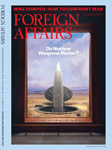It was the year of the Great Revival, following the Great Survival. It was to replenish the earth. Replenish it of every life form possible - plants on the ground, fish in the waters, birds and insects in the air; and people, of course. The last great war happened in 2067.
The tragedy of wars was proven once again but the greatest tragedy of all are all the wasted lessons written on the pages of history. Is it because history is usually written by the victors? Or, is it that victors soon forget but the vanquished, never? Or, is it the viciousness of the cycle of history to blame? Is it that defeat is not soon forgotten by the vanquished while the victors fog their memory so quickly with the sweet nectar of euphoria from victory. Victors always forget that winning is always temporary.
Whatever is the story, one thing is for certain. Not a century had passed during the last six thousand years of recorded history when there was no human conflict of some kind on the face of the earth. Below is just what foreign policy experts are watching at the present moment. The proverbial Biblical listing of "wars and rumors of war".
Then, we are we are met with:
The New Geography of Conflict
Abstract
"As last year's global shortage of petroleum and natural gas showed, the world can no longer keep up with the demands of continued population growth and economic expansion. Indeed, the competition for natural resources is intensifying. And with four-fifths of the world's oil reserves lying in politically unstable areas, with diamond and timber wars already raging in Central Africa, and with many regions suffering persistent drought, resource competition could easily turn into open conflict. Governments now see the acquisition and protection of natural resources as a national security requirement--and one they are prepared to fight for."
Back to "whatever is the story", where all existential threat that we worry about, none can be more devastating to life and property than the outbreak of a war. Whether it is a limited war or one that encompasses territorial boundaries, the tragedy is frightening to contemplate; to experience it is direfully horrifying. Along with the physical pain for those who survive is profound mental anguish that is almost impossible to assuage. A nuclear war is unthinkable even from the most hawkish of politicians and pundits.
Added to that are threats forced upon us since the 70s, when we were warned about destroying our environment, when in 2010 we were told we had just twelve years before the catastrophe of climate change will be upon us. Rising sea level, melting ice caps, flooding, drought, diseases, crop failures, etc. - all manifestations of our profligate use of fossil fuels, we've been told. Failed prophecies were unclaimed except that new ones are hoisted upon us once the prophets were proved wrong with such "inconvenient truths". Again and again.
From the italicized quoted paragraph above we see instead the need for fossil fuel to sustain each nation's economy and the commercial demands for it that will persist for decades to come. The debate continues without resolution because each side, however many sides there are, will always be only partially right. The war on fossil fuel is not only unfair, it is not winnable. On the other hand, an all out assault on renewable and alternative sources of energy is also a fool's errand. The failure to compromise, lest we forget, dooms all sides. The political rhetoric on a campaign to win votes by promising to put the oil industry out of business is an outright lie to win an election. And on and on it goes.
Let's zoom out from here and out into the far reaches of space, as far as we can imagine. Imagine an observer from somewhere out there looking into our spot in the universe. All they will see is a swirling smudge of light.




No comments:
Post a Comment